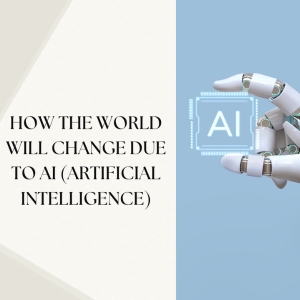How the World Will Change Due to AI (Artificial Intelligence)?Posted by Atul on August 30th, 2023  What is AI?Artificial Intelligence (AI) is quickly emerging as one of the most powerful and influential technologies of the 21st century. It is defined as the automated decision making process by which machines use algorithms to “learn” from data and make decisions in various fields such as healthcare, finance, and manufacturing. One of the main ways in which AI can be used is through Machine Learning. Machine learning uses computing algorithms to enable computers to identify patterns or trends from a set of data so that they can make predictions or decisions. This makes it possible for machines to respond accurately to different types of inputs without human intervention. For example, in healthcare applications, machine learning can be used to identify warning signs of illness before someone shows physical symptoms. Similarly, in financial services, machine learning algorithms can predict stock prices based on current market conditions with little manual input. The applications of AI are far reaching and its impact on our world will reshape how we work and live. By automating processes, businesses will save time and money while reducing errors that might have been caused by humans due to their biases or limited knowledge. Additionally, AI has been proven to improve customer service by providing personalized experiences based on customer preferences or behaviors. In healthcare, AI has revolutionized diagnosis times by making medical decisions more accurately and effectively than ever before while also increasing access for patients living in rural areas who couldn’t physically get to a hospital or clinic for diagnosis or treatment.. How AI is Transforming the Way We LiveArtificial intelligence (AI) is rapidly changing the way we live. AI, automation, data science, machine learning and predictive analytics are all playing a major role in this transformation. With AI, automated customer service is now a reality where people can interact with computers without any human input. Robotics and autonomous vehicles are also making huge headway and are quickly revolutionizing transportation and mobility. These advancements have also enabled the development of smart cities and homes that can monitor energy usage, optimize traffic flow and reduce crime rates. In addition to these changes, the use of AI is also transforming human lives through augmentation technologies like biometric implants, exoskeletons and braincomputer interfaces that enable us to enhance our capabilities and performance levels beyond our normal physiological limitations. While these advantages of AI are clear for all to see, one should not forget that part of this transformation includes a significant amount of disruption to our world as well. For instance, job displacement is an inevitable reality due to increased automation fueled by AI which may potentially lead to a myriad of socioeconomic problems. Impact of AI on Business and EconomicsAs Artificial Intelligence (AI) continues to evolve and become a bigger part of everyday life, it’s important to recognize the impact this emerging technology could have on businesses and economics. AI is automating many labor-intensive tasks, leading to job loss and creation in different industries. It’s also changing the way businesses operate, streamlining operations with robotics and drones. Additionally, AI is making it easier for companies to analyze large amounts of data and make decisions more quickly—without human intervention. AI is also driving the development of new economic models. This includes the rise of robotic process automation (RPA), which can handle complex tasks like payroll processing in a fraction of the time as manual processes. RPA will be a disruptive force in markets around the world, allowing companies to reduce costs while improving efficiency. Furthermore, AIdriven machine learning algorithms are making advancements in areas such as recommendation systems, creating highly personalized customer experiences that were not possible before. In conclusion, AI will continue to shape how we do business and our global economy. It has already proven that it can improve operations, create jobs, and disrupt markets in ways never seen before. As we move forward into this new era of technological advancement, understanding its implications for business and economics will be essential for companies hoping to stay competitive in an everevolving market. Healthcare Implications of AIAs AI advances, more healthcare processes can be automated, such as record keeping, laboratory testing, imaging report generation, patient scheduling, and disease monitoring. By incorporating machine learning into these tasks, providers can save time and patients will benefit from a faster diagnosis and treatment plan. Robotics are also beginning to be used as assistive technology for doctors in intricate surgical procedures – potentially leading to fewer complications for patients during surgery. AI is also being used in predictive analytics models that leverage data science techniques such as natural language processing (NLP), computer vision (CV), or electronic health records (EHRs). These models can forecast future health outcomes in order to take preventive measures before a disease has even been diagnosed. Additionally, by combining genomics with AI algorithms it is possible to more accurately personalize a patient’s treatment plan based on their individual genetic needs. Incorporating AI technology into the healthcare system promises a number of benefits for both patients and providers. From reducing wait times and reducing costs through automation to providing greater accuracy in diagnosis and faster treatments through robotics – AI can help create a more cost-effective healthcare system with an improved patient experience. It’s no wonder that so many healthcare organizations are now embracing this technology – the potential rewards far outweigh any risks! Data Analytics Courses Kolkata Potential Ethical and Social Challenges from AIOne way is for businesses to adopt legal and ethical frameworks that protect the privacy of user generated data. Companies should also invest in robust security measures, such as strong encryption protocols and authentication systems. Additionally, organizations must ensure that their employees understand the risks associated with managing sensitive customer information, and develop training programs that promote responsible data handling practices. Another ethical concern stemming from the use of AI is bias; computers tend to encode human biases into their algorithms, leading to potentially unfair outcomes for certain groups of people or demographics. To prevent this, companies should be vigilant about applying fairness checks on their models before they are released into production. Additionally, building diverse teams with people from various backgrounds can create a culture where fairness is inherently built into company products rather than tacked onto existing models at the end. Finally, there is the question of accountability when it comes to machines making decisions supported by AI algorithms; who will be held responsible if something goes wrong? Companies should strive to build automation systems with failsafes built in so that if something does happen, they can trace it down quickly and accurately determine who can be held accountable for any mistakes made. Data Science Training In Noida Researching the Benefits of Artificial IntelligenceWe are living in a world of rapid technological advancements, where Artificial Intelligence (AI) is leading the way. By leveraging AI technologies such as machine learning and data science, businesses and industries are enabling automation opportunities to improve their productivity. However, AI is also having a profound impact on how humans work and interact with machines, as well as society as a whole. With the introduction of disruptive technologies and innovations, AI brings new opportunities for digital transformation. This can enable people to achieve more with less effort than ever before, while also increasing efficiency across multiple processes. For instance, selfdriving cars powered by AI are slowly taking over roads throughout the world – drastically altering the way we travel and commute. As such, it’s important to understand what AI can do and how it can potentially shape our lives in the future. AI applications are already providing great value to businesses and industries of all kinds; from healthcare to finance. For example, computer vision technology is allowing medical professionals to detect illnesses more accurately than ever before. In addition, data analytics are giving companies valuable insights into customer behavior – allowing them to improve customer experience and satisfaction rates accordingly. Data Science Institute In Delhi Preparing for a World Changed by Artificial Intelligence The emergence of Artificial Intelligence (AI) is revolutionizing the way we live and work. AI applications, such as Machine Learning and Data Science, are leading us towards a new era of automation and robotics. As such, many of the world’s organizations are preparing for a world transformed by AI by reducing costs and increasing efficiency and productivity. However, there are other implications to consider in this AIdriven world. For example, one potential outcome could be job losses due to increased automation; however, this could also lead to new roles in data science or machine learning. Additionally, ethical considerations must be taken into account when implementing new technologies. What safeguards must be implemented to ensure that AI is used responsibly? Questions like these come up when preparing for a world changed by Artificial Intelligence. The economic impact of AI-driven transformations can be vast. Companies might have to invest in updating systems or retraining personnel while simultaneously trying to maintain business continuity and profitability. It is important that organizations take a holistic approach when preparing for such transformations by looking at both the short-term and long-term implications they may face economically due to AI technology adoption. To prepare for a world changed by Artificial Intelligence, it is essential that organizations consider how best to use existing technologies while addressing any ethical concerns associated with them. They must also assess how their operations will be impacted by potential job losses as well as economic impacts resulting from such transformations. Like it? Share it!More by this author |


